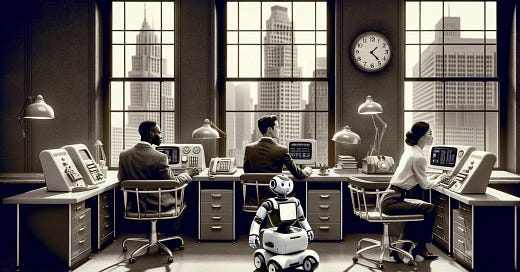Knowledge Work in the Age of AI: What Would Peter Drucker Say?
Watch Boxcars.ai Automate Data Entry Work so Your Team Can Focus on Insights
In 1959, business guru Peter Drucker first defined the term "knowledge worker" in his book Landmarks of Tomorrow. He predicted that as the economy shifted away from manufacturing physical goods, the workforce would transition from manual labor to "workers who apply theoretical and analytical knowledge."
Drucker foresaw that by the end of the 20th century, knowledge workers would become the dominant group in the workforce. In fact, knowledge work occupations have been adding more jobs than any other year since the 1980s—about 1.9 million per year.
Managing these knowledge workers would require a different approach, Drucker argued. Rather than optimizing machines, managers had to improve the productivity of the human mind. But in the 21st century, a new class of artificial knowledge workers is emerging that Drucker did not anticipate - AI. This article explores how AI knowledge workers can collaborate with humans, through the lens of Drucker's theories
Harnessing Knowledge Worker Productivity: Drucker's Vision
Peter Drucker's interest in knowledge workers stemmed from his broader focus on management theory and practice. He studied how to make organizations more efficient and productive, first in the industrial economy and later in the knowledge economy.
Drucker recognized that knowledge work was fundamentally different than factory work. As he wrote, "In knowledge work...the task is not given; it has to be determined." Knowledge workers must collect data, process information, and identify problems before acting.
Unfortunately, today, much of knowledge workers' time is spent on repetitive manual tasks involving data - copying, processing, and preparing. We've turned skilled workers into unfulfilled clickers and typers stuck behind computer screens.
Let's consider a digital media agency that buys radio and TV ad placements for clients across the country. Every month, they receive invoices from hundreds of stations. An employee has to manually extract the crucial information from each invoice to build a reporting dataset, from which insights can be generated. Since stations can provide their information in different formats, this process can be tedious and involve a lot of repetitive work.
AI: The Next Generation of Knowledge Workers
Drucker saw the importance of automating these repetitive tasks. As he put it: "The most important contribution management needs to make in the 21st century is similarly to increase the productivity of knowledge work and the knowledge worker." But, it is unlikely he foresaw a future in which AI workers sit alongside us in the knowledge assembly line.
My company, boxcars.ai, is working to make this a reality for our clients. In the demo below we'll see how the media agency could benefit from boxcars.
Usher in the Age of AI-Augmented Knowledge Work
Peter Drucker opened managers' eyes to the promise of knowledge workers over half a century ago. Today, AI gives us the opportunity to take Drucker's vision even further. Workers augmented by AI can achieve levels of productivity and insight unattainable alone.
How do you get started? Re-examine workflows and integrate AI where it can take on repetitive tasks. Don't leave your team stuck in manual modes.
If you see unfulfilled potential in your organization, get in touch and let's discuss how AI can automate rote work and allow your team to focus on the strategic work.




